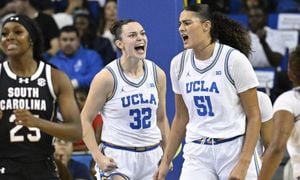Social media and its impact on teenagers have been hot topics for discussion, especially as many parents and educators seek to understand the complex digital world kids navigate daily. The newly released docuseries, Social Studies, directed by acclaimed filmmaker Lauren Greenfield, takes viewers on an unfiltered tour of the lives of today’s teens, exploring the mixed blessings of increased connectivity and the often overwhelming pressures associated with it. Premiering on FX and available on Hulu, this five-part series builds upon narratives familiar to many but adds depth and authenticity through the firsthand accounts of adolescents.
Greenfield's Social Studies provides not only eye-opening experiences but also insights directly from the teenagers who participated. Over the course of the project, which lasted over a year, she sifted through the personal smartphones of numerous teens, encapsulating their struggles and achievements as they unfolded. This unique approach sheds light on the reality of living as digital natives, marking them as the first generation raised entirely with social media.
Among the teens featured, Sydney, for example, grapples with the need for validation through likes and shares on Instagram. Her story highlights the extent to which youth use social media as both a measure of self-worth and as a pressure-cooker environment. Jonathan, another participant, finds himself constantly bombarded with the successes of peers who have already landed spots at prestigious universities, illustrating how social media creates a new battleground for academic and social comparison.
Cooper, another voice of this generation, openly expresses his frustration, “I think social media makes a lot of teens feel like shit, but they don't know how to get off it.” Through these candid discussions, the docuseries not only presents personal narratives but also invites viewers to reflect critically on the role of social media and its psychological toll.
Social Studies intricately weaves these narratives with broader themes about the pressures teens face, showcasing discussions where young people candidly speak about their concerns over harassment, unrealistic beauty standards, and the rampant availability of explicit content online. An unnamed girl poignantly states, "It's hard to tell what's been put onto your mind, and what you actually like," probing the conflict between external expectations and personal identity.
One powerful segment of the series occurs during group discussions where teens confront the contradictions of their online personas against their true selves. The pressure to conform to idealized images seen on social media often distorts their body image, as one anonymous teen points out their desire for physical perfection based on societal standards heralded online. These narratives convey the urgency and necessity for open dialogues about social media’s complex dynamics.
Despite the overall grim undertone surrounding social media use, Social Studies doesn't shy away from showcasing resilience. For example, it features the story of a transgender teenager who, having been estranged from her biological family, finds support and acceptance through online communities. This narrative highlights the duality of social media as both perilous and potentially life-affirming.
Greenfield emphasizes the significance of not only documenting teen experiences but also educating parents and educators on these issues. This aligns with initiatives rolled out by the Annenberg Foundation, which recently launched free online resources aimed at helping adults navigate the challenges associated with teens and social media. “It was really important to me to build curriculum and to make parent guides to provoke discussion about the challenges facing teens today,” Greenfield notes on her approach.
The curriculum developed alongside the series covers aspects prevalent within the episodes, such as social justice, body image, and mental health, which are issues deeply intertwined with teens’ online lives. This educational component aims to bridge conversations between parents and teens, fostering spaces where such discussions can occur freely.
Wallis Annenberg, who serves as Chairman, President, and CEO of the Annenberg Foundation and is also the executive producer of Social Studies, says, “Lauren Greenfield’s Social Studies documentary series takes a deep, unfiltered look at the impact of social media on today’s youth and mental health.” He believes this collaborative effort has the potential to change the way parents and educators approach social media’s role.
Recent concerns voiced by health experts highlight the risks of unchecked access to social networks and the mental health crisis it is believed to fuel. The U.S. Surgeon General has publicly called for action, advocating for warning labels on platforms and even policies to limit smartphone use within school environments. Notably, bipartisan legislative movements are taking shape, with both Republican-led Florida and Democratic-led California implementing significant measures to limit smartphone usage during school hours.
“Collective action is the only way,” asserts Greenfield, urging for broader awareness and initiative to help today’s youth. She captures the sentiment of many teens who feel they have to be connected to maintain their social lives, emphasizing the difficulty of stepping away from what is perceived as the primary social space for their generation. “If you’re the only one who goes off (social media), you lost your social life,” is echoed by countless youths who feel trapped within this digital ecosystem.
While the series reflects troubling realities, it also empowers teens' voices, allowing them to lead the narrative around their experiences rather than relying solely on external experts. Documenting this phenomenon sets the stage for necessary conversations about social media’s influence on childhood and adolescence.
Social Studies serves as both a wake-up call and resource, signaling the urgent need for families, schools, and broader communities to engage with the topics it raises. The combination of personal stories, educational tools, and communal discussions aims to encourage open dialogues and proactive measures to safeguard mental health during adolescent years wrought with challenges brought on by the digital age.



